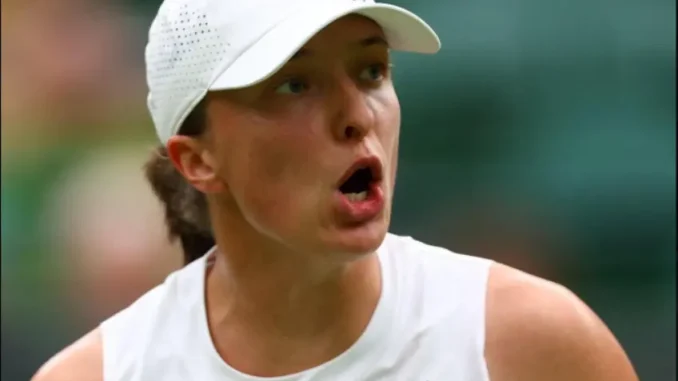
As the tennis world converges on the All England Club for the 2025 Wimbledon Championships, Iga Swiatek, the five-time Grand Slam champion, has issued a powerful critique of the sport’s punishing schedule. The 24-year-old Pole, now ranked No. 4 globally, used her pre-tournament press conference on Sunday to highlight how the relentless calendar is draining players and diminishing the quality of the game for fans. “The scheduling is super intense. It’s too intense. There’s no point for us to play over 20 tournaments in a year,” Swiatek declared, her words resonating with a growing chorus of players frustrated by the sport’s demanding structure.
Swiatek’s remarks come at a pivotal moment. Fresh off a strong grass-court showing at the Bad Homburg Open, where she reached her first-ever grass final but fell to top seed Jessica Pegula, the former world No. 1 is candid about the toll of the 11-month season. The pressure to compete in mandatory WTA 500 and 1000 events to maintain rankings often forces tough choices, such as skipping national team duties. Swiatek herself opted out of Poland’s Billie Jean King Cup qualifier in April to preserve her energy for tour events, a decision she found agonizing. “Sometimes we need to sacrifice playing for your country because we need to keep up with playing these WTA 500s, for example, because we’re going to get a zero in the ranking,” she explained, underscoring the rigid system that penalizes players for prioritizing personal well-being or national pride.
The Polish star argues that the current schedule—described as “unsustainable” by the Professional Tennis Players’ Association in a March lawsuit against tennis’s governing bodies—compromises both player performance and fan experience. “I think people would still watch tennis, maybe even more, if we played less tournaments. The quality would be better,” Swiatek asserted. She believes fewer events would allow players to deliver more consistent, high-level performances, elevating the sport’s appeal. Her sentiments echo those of peers like Naomi Osaka and Bianca Andreescu, who have taken breaks to protect their mental health, highlighting a broader crisis in the sport.
Swiatek’s 2025 season has been a challenging one. Despite her dominance on clay, with four French Open titles, her three-year reign at Roland Garros ended in a semifinal loss to Aryna Sabalenka earlier this month. The defeat, coupled with a title drought since her last victory over a year ago, saw her slip from the world No. 1 spot she held for 125 weeks. Yet, her recent performance in Bad Homburg, where she defeated Jasmine Paolini and Ekaterina Alexandrova before losing to Pegula, signals progress on grass, a surface where she’s historically struggled. “Probably so far it’s the best one that I’ve had,” she said of her Wimbledon preparations, noting the extra practice time after her early Roland Garros exit helped her adapt to the faster courts. “It’s not like a huge change. It’s not like 180 degrees change. I wouldn’t say now suddenly everything is perfect, because it’s still a difficult surface.”
As Swiatek prepares to face Russia’s Polina Kudermetova in her Wimbledon opener on Tuesday, she carries the weight of expectations and a renewed focus on mental resilience. Her work with sports psychologist Daria Abramowicz has been instrumental in navigating the pressures of the tour, a journey she’s been open about since her breakout 2020 French Open win as a teenager. Off the court, Swiatek’s commitment to social causes, like raising funds for Ukrainian children through charity auctions, reflects her broader perspective on her platform. Yet, her immediate challenge lies on Wimbledon’s grass, where she’s never advanced past the quarterfinals despite her junior title in 2018.
The tennis world is listening as Swiatek’s call for reform gains traction. Her advocacy, backed by her stellar record of 22 WTA titles, including the 2023 WTA Finals, underscores the urgency for change. As she steps onto Court No. 1, Swiatek’s fight isn’t just for a Wimbledon breakthrough but for a sport that values its players’ health and longevity, ensuring the game’s brightest stars can shine without burning out.
Leave a Reply